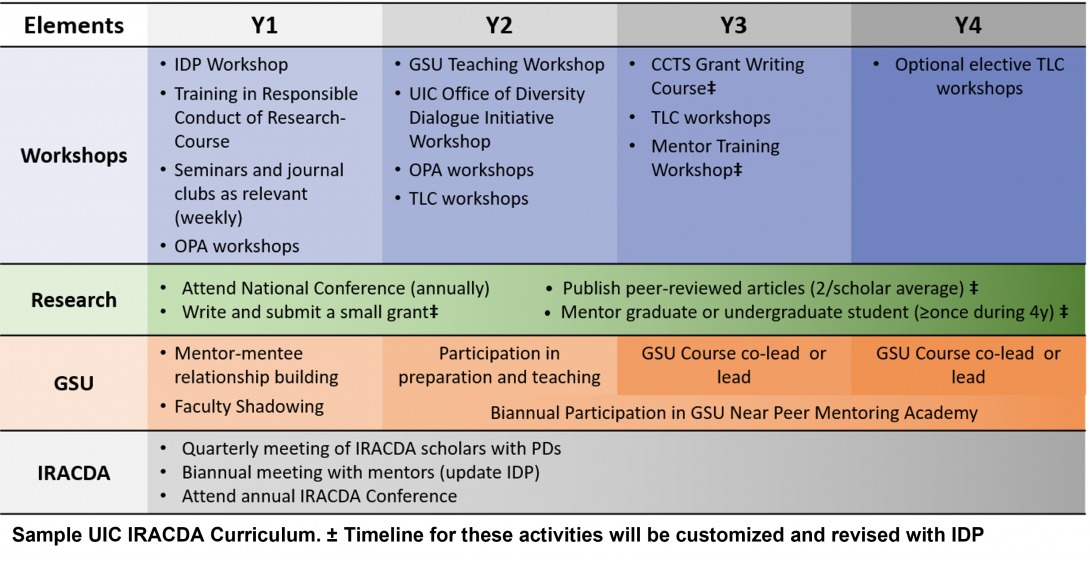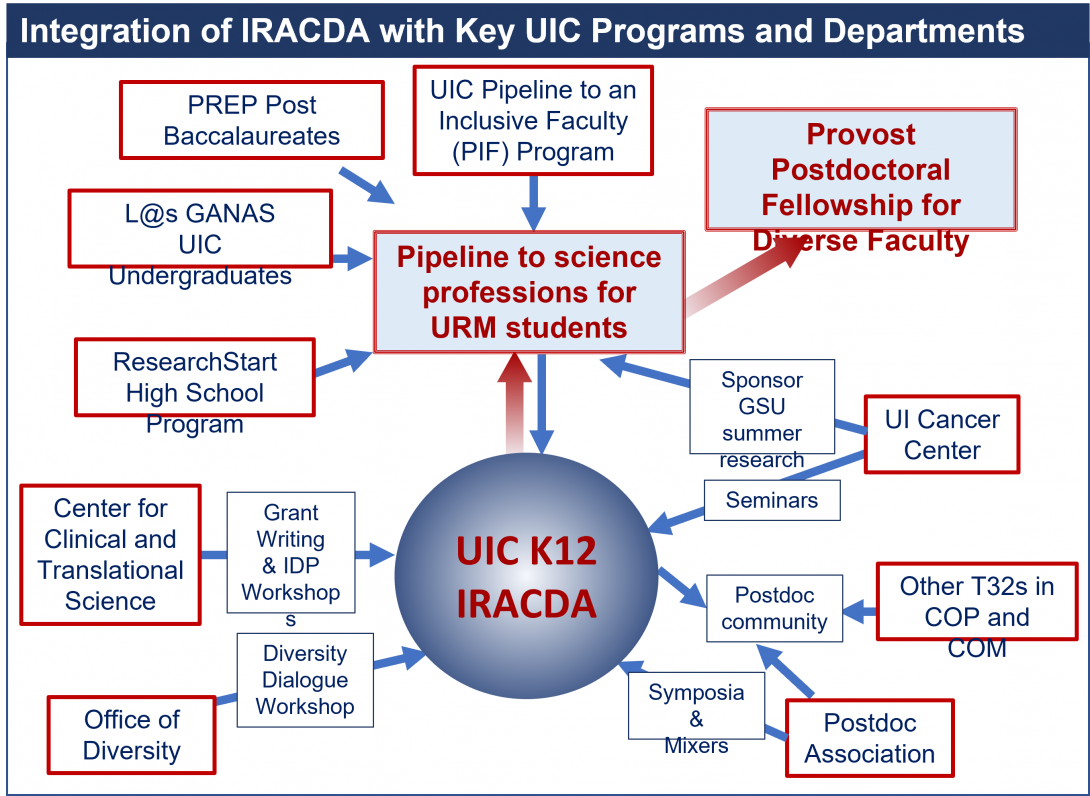Program Components
The UIC IRACDA program focuses on three major areas: Research, Teaching, and Professional Development. The main focus of the program is research, with the added bonus of evidence-based teaching training built into the curriculum. Mentor coaching and opportunities are included in all focus areas. Each scholar will tailor their programmatic activities according to their career goals, with the assistance of the Program Directors, using an Individual Development Plan (IDP).
continued

For more details, please see the Research, Teaching, Professional Development sections below. In all cases, the timeline for programmatic components will be customized and continually revised with assistance from the mentoring team and Program Directors. The actual progression of work in the UIC IRACDA program is flexible, in order to best foster growth of the scholars and align with their career goals.
Program
Research
Year 1:
Research will be a major focus of year 1. Scholars will attend the Individual Development Plan (IDP) workshop and, in conjunction with their mentoring team, create a personalized IDP within the first few month of the program. They will development their major research project, participate in lab meetings & journal clubs, and attend relevant seminars to their field. Scholars will complete training in the Responsible Conduct of Research. Ideally, scholars will publish on average 1 paper/year, which in year 1 may be a review or co- author publication. They will also present their research at national and local meetings an average of 2/ year, including a research poster at the Annual National IRACDA Conference. Scholars will attend quarterly meetings with the Program Directors, biannual meetings with their mentoring team, and quarterly meetings with their secondary and teaching mentors (see Teaching section) individually.
Year 2:
Scholars will be fully engaged in their major research project by year 2, and will continue to attend relevant lab meetings, seminars, and mentoring meetings. They will begin publish independent peer-reviewed research articles (if not in year 1) as first or co-authors, and will present at a national scientific meeting in addition to the IRACDA Conference. Scholars may take on research mentoring roles in their labs and begin to guide undergraduate and graduate student researchers in their field.
Year 3:
Scholars will carry on their major research project. They will continue to attend lab meetings, seminars, and mentoring meetings. Scholars will continue publishing independent peer-reviewed first-author research articles and attending national scientific/IRACDA meetings. Scholars will attend the Center for Clinical & Translational Science (CCTS)-hosted “Grant Writing for New Investigators “ workshop and will apply for independent funding by the end of year 3 (or 4, if applicable). The CCTS also provides a “Mentor Training Workshop” that scholars will participate in to hone their research leadership skills, and scholars will continue or begin mentoring junior researchers in lab (see Professional Development section).
Year 4:
Scholars who opt for a 4th year of training will continue in their research activities according to what best suits their interest and career trajectories.
Teaching
Year 1:
Scholars will work with their mentor and Program Directors to establish a teaching mentor at Governors State University (GSU) whose course content and focus best aligns with the scholar’s research interests and career goals. In the first semester of the program, scholars will shadow GSU faculty to establish a basic knowledge of how to teach and build the mentor-mentee relationship. They will work with GSU faculty to identify optimal teaching areas corresponding to their career goals, such as a wet-lab course module or a lecture style course. By tailoring the curriculum to a scholar’s career goals, the program will work with mentoring teams to best identify areas for new course material (labs) or entire course design at GSU.
Year 2:
In year 2, scholars will begin to supplement their teaching exposure with formalized training. At UIC, scholars will participate in one workshop/semester organized by the Teaching and Learning Center (TLC). At GSU, scholars will attend in the “Workshop on Techniques and Strategies for Effective Teaching”, an annual half-day workshop on university teaching. Starting in year 2 (and on), scholars will also contribute to both the annual GSU Faculty Institute, a 1-day event held at the beginning of each academic year, and the “Near Peer” Mentoring Academy with GSU (see Professional Development section). Scholars less teaching experience prior to the UIC IRACDA program will begin assisting their teaching mentor in class preparation and continue shadowing in the classroom, eventually progressing to leading lectures and laboratory sections. Scholars who have more teaching experience may only shadow briefly before gaining the skills and confidence to lead teaching sections independently in year 2.
Year 3:
Scholars will continue participating in TLC workshops at UIC, and will be encouraged to develop and present their own topics at the GSU “Workshop on Techniques and Strategies for Effective Teaching”. They will continue teaching courses at GSU. Depending on their experience, progression, and career goals, this teaching can also include developing new class materials and/or new course design. Options include enriching lab modules by introducing state-of-the-art research techniques, adapting the current UIC PHAR 201 course for GSU undergraduates, developing and leading a special topics course of their design focused on contemporary biomedical advances, or leading/co-leading an already established GSU course (lab- or lecture-based).
Year 4:
Scholars who opt for a 4th year of training will continue in their teaching activities according to what best suits their interest and career trajectories.
Professional Development
Year 1:
In year 1, scholars will attend career & professional development workshops, seminars, and lectures presented by the UIC Office of Postdoctoral Affairs (OPA). They will also participate in quarterly meetings with the Program Directors, during which program logistics, progress, and challenges will be discussed. Career development is included, tailored to the scholars needs. Note that these IRACDA meetings will supplement topics covered by the OPA and provide more focused information specific for IRACDA scholars.
Year 2:
In addition to the year 1 programmatic activities, scholars will attend the Office of Diversity-sponsored “Words Matter: A Dialogue on Diversity and Inclusion” in year 2 of the IRACDA program. They will begin annual (Y2-3/4) participation in the GSU “Near Peer” Mentoring Academy. To ensure clear benefits of the UIC IRACDA program to the undergraduate student body of GSU, IRACDA scholars meet with GSU students and mentor them on how to apply for summer undergraduate research fellowships, how to find and apply to professional and graduate schools, how to obtain undergraduate experience in research, and preparation of CVs and personal statements.
Year 3:
Scholars will participate in the CCTS-sponsored “Mentor Training Workshop”, which was adapted from the National Research Mentoring Network series “Mentoring Clinical & Translational Science Researchers”. This program utilizes case studies, discussion questions, and other activities and includes modules such as: facilitation overview, maintaining effective communication, aligning expectations (includes peer mentoring), assessing understanding, addressing diversity, fostering independence, promoting professional development, and articulating your mentoring philosophy and plan. Scholars will enhance and refine their research and teaching mentoring roles, as well as their positions as “Near Peer” mentors, based on this training.
Year 4:
Scholars who opt for a 4th year of training will continue in their professional development activities according to what best suits their interest and career trajectories.
FAQs
What is the UIC IRACDA salary?
UIC IRACDA scholars are paid according to the NIH salary scale, with annual increases based on years of experience. Scholars will receive $2000/year to attend the annual IRACDA conference and an additional $2000/year to attend relevant trainings and/or scientific meetings. The cost of the UIC IRACDA Annual retreat and required UIC- and GSU-based training workshops are also included. Scholars will receive $2000/year toward the cost of supplies such as computers, research and teaching-related software, textbooks, teaching materials, etc.
Will I get enough time to work on my research project as a UIC IRACDA scholar?
Yes! The main focus of the IRACDA program is research. On average, ~75% of your time in the 3 years will be devoted to scientific research. If the 4th year is needed/desired, it can be tailored to your career path and interests, and therefore can be research-intensive.
How is the program time distributed between research & teaching?
The expectation of the program is to devote 75% of the time to research and 25% of the time to teaching over the course of the 3-4 years. While this division of focus correlates to an average of 10h/week dedicated to teaching activities, in reality there will be some weeks with 0 h and others with 20 hours, as the program is designed to increase teaching intensity over the duration of the fellowship to peak during one semester of third year of the IRACDA program.
FAQs 2

What are the teaching expectations?
For detailed information on teaching requirements, see Teaching section (above)
What sort of professional development is included in the program?
For detailed information on professional development, including mentoring opportunities, see Professional Development section (above)
How often do scholars meet as a group?
The IRACDA scholars meet every month for Professional Development workshops, and with the Program Directors quarterly for ~ 2 h. Annually, one of these meetings is expanded to a half-day session to showcase scholar achievements with short presentations, and will include all research mentors. Scholars also meet with their mentoring team and the Program Directors twice annually, with their secondary mentor quarterly, and with their GSU teaching mentor quarterly. Scholars regularly overlap with each other at required and elective research, teaching, and career development workshops (see Program section). Scholars and Program Directors attend the National IRACDA conference together annually.
How many conferences can I attend?
National exposure is essential for a career in research, and scholars should present at a national (or equivalent) meeting annually. Attendance should include a poster presentation of research projects and/or an oral presentation, if invited. UIC IRACDA scholars are also expected to attend the National IRACDA conference annually.
Interactions

Although the UIC IRACDA program is housed in the Colleges of Medicine & Pharmacy, the training plan integrates and complements many existing programs at UIC. These include the UIC Center for Clinical & Translational Sciences (CCTS), Office of Postdoctoral Affairs (OPA), the UI Cancer Center, and the newly formed Center for Teaching Excellence, to name a few.